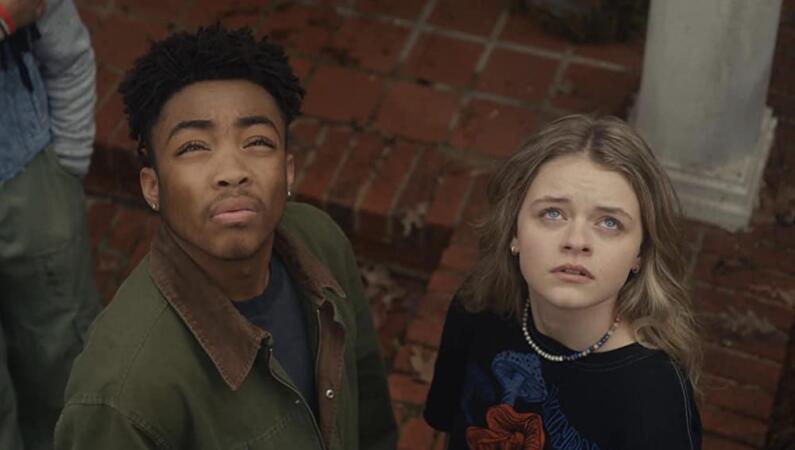At first glance, you think you know what to expect from Landscape With Invisible Hand— a trendy, Gen Z-approved sci-fi with not-so-subtle shaming regarding our treatment of the planet. Instead, the film departs from the predictable aspects of modern installments within the genre and manages to open up some interesting conversations about race, privilege and humanity.
Based on the novel by M.T. Anderson, the film, which premiered at the 2023 Sundance Film Festival, follows Adam (Asante Blackk) and Chloe (Kylie Rogers), who are coming of age following an alien invasion in the near future. Adam and Chloe’s families are strapped for cash (the latter’s way more than the former’s), and in order to help provide financial stability, the pair decide to livestream their budding romance for the amusement of the aliens. Their new business venture, plus the fact that Chloe’s family is living with Adam’s, leads to some tension that quickly turns this we-found-love-in-a-hopeless-place tale into survival of the fittest.
There are many sad truths about the world we’re invited into in Landscape. But the most depressing is the erasure of childhood, and everything it should mean to be a child. We’ve seen depictions of loss of innocence in film before, we’ve seen it in real life too, but in those reflections, there’s an understanding that this painful reality won’t last. There’s always a twinkle of hope– movies manufacture, it and in real life, we’re constantly reminded that there’s something we can do to help.
Things are much bleaker in this movie. Parents cannot protect their kids, no matter how much they want to. Parental figures are eliminated. Every safe, stimulating place for children is eliminated. Every adult is defeated, which leaves the kids to pick up the pieces. That truth is portrayed beautifully in the film, by way of complicated parent-child relationships and intentional character development.
The beacon of light in this film is Adam’s character, which Blackk brings so much charm and heart to. Adam’s an artist— an incredibly talented one at that— and his art reminds us that a morsel of the human experience still remains. It’s familiar, as is Blackk’s performance, which feels like an elevated version of his work portraying Malik Hodges.
Tiffany Haddish, on the other hand, delivered a performance unlike what we’ve seen from her before. She reaches new depth and range as a performer in Landscape.
But what’s most intriguing about this film is the dynamic between Chloe and Adam’s family. Their families staying together is a compelling power struggle and Chloe’s family, who is white, carries so much animosity towards Adam’s. The root of that animosity is feeling as though they have been socially wronged— no way the Black family can be doing better than us. It’s engaging watching this racially-charged jealousy evolve.
Landscape is a multi-layered film that’s thrilling and intriguing, and will inspire new takeaways each time you watch it.

